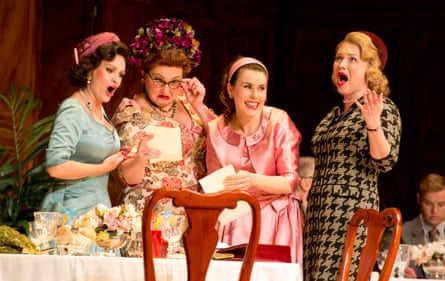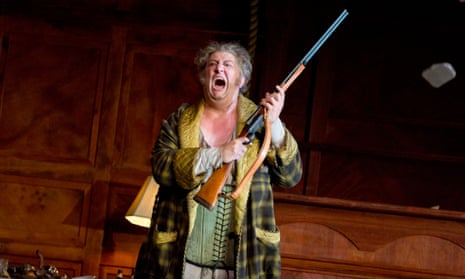Since it opened at Covent Garden in 2012, the Robert Carsen production of Verdi’s final opera has been to the Met in New York, where the pictures it paints of British middle-class life in the 1950s probably seemed suitably quaint and amusing. Back in London for its first revival (which has been directed by Christophe Geyral), it once again raises comparisons with Richard Jones’s Glyndebourne version, which also relocated the work to postwar Britain.
But where that updating was wonderfully witty, visually deft and – above all – profoundly affectionate, the Royal Opera production seems calculating, cosmetic and heartless. Jones completely understood the world that he satirised so gently, Carsen seems to use it because he can, and without, it seems, any real understanding of what it evokes or of the clash between aristocratic entitlement and middle-class aspiration that such an updating automatically highlights.

The clutter of flunkies in the country-house hotel setting of the first half sometimes undermines the musical performance too, offering no kind of visual clarity for the great nonet in the second scene, and distracting attention from the final moments of Ford’s great outburst of rage in the third. Such moments, as well as the obstacle course that the singers have to negotiate while joining in the final fugue, do make you wonder how much this production took account of the miraculous score that drives the drama so faultlessly.
Musically the revival gets by, though none of the cast, apart from Ambrogio Maestri who returns in the title role, is exceptional. Without Maestri’s burnished tone and immaculate projection it would be a much duller evening, but even he doesn’t really project Falstaff’s fading old-world grandeur as much as he might in a different production. There’s a sparky Nannetta from Anna Devin, too, while Alasdair Elliott and Lukas Jakobski are a well-practised double act as Bardolfo and Pistol; the rest, like Michael Schønwandt’s conducting, is routine.
- At the Royal Opera House, London, until 18 July. Box office: 020-7304 4000.

Comments (…)
Sign in or create your Guardian account to join the discussion